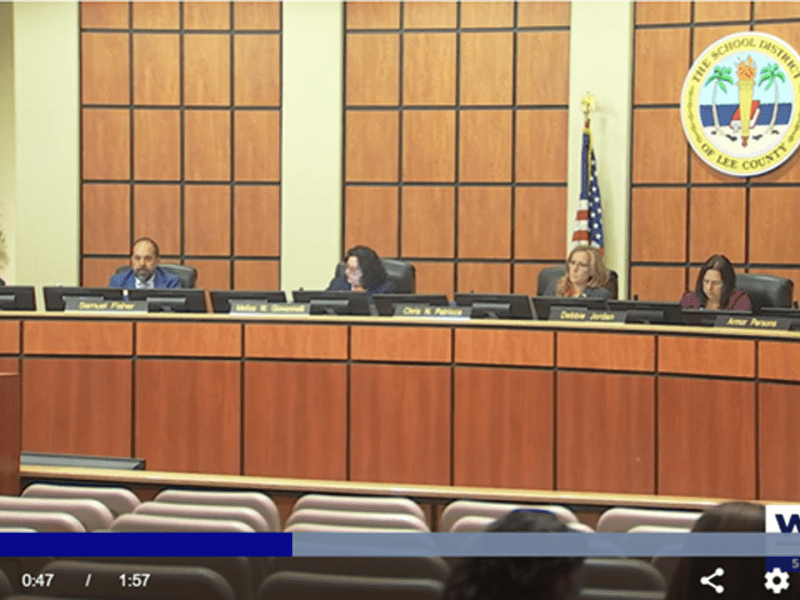
Top DeSantis official embraced critical race theory in dissertation
Politico | By Matt Dixon and Andrew Atterbury | December 20, 2021
TALLAHASSEE — Gov. Ron DeSantis has called critical race theory a “Marxist” ideology that has no place in public schools. But a top official in his administration had previously taken a very different stance.
Eric Hall, who DeSantis recently appointed to head Florida’s Department of Juvenile Justice, used critical race theory as the bedrock of his 2014 dissertation examining alternative schools. Hall, who finished the dissertation while completing his doctorate at the University of South Florida, wrote that critical race theory was a good “framework” to study racial inequities in the public education system.
“Critical Race Theory (CRT) provides a grounded set of beliefs that seek to uncover and expose racism and its related impact on those who are often without power, in the case of this study, minority students,” Hall wrote in his dissertation, which POLITICO obtained.
Hall was an official in the Florida Department of Education before DeSantis appointed him to the juvenile justice department.
Hall’s 272-page dissertation studied two “alternative” schools and how the public education system displaces minority students at higher rates through expulsion and other factors. In turn, that can lead to large numbers of minority students ending up in the “school-to-prison pipeline.”
He concludes, in part, that school curriculum is crafted in a way that specifically disadvantages minority students.
“Understanding this practice and the fact that ‘democratic choice is not necessarily available for all,’ CRT can help to shape the manner in which the top is explored while also exposing the bias maintained by the author of this inquiry, who is a middle-class, white male,” he wrote, citing a 1989 essay “White Privilege: Unpacking the Invisible Knapsack” by feminist Peggy McIntosh.
The revelation that Hall had used critical race theory in his dissertation comes at a time when DeSantis has demonized the framework as an effort by Democrats to indoctrinate students to a leftist ideology. DeSantis has consistently used critical race theory to stir his political base ahead of his 2022 reelection as he continues to build a national profile among Republicans.
DeSantis last week proposed new legislation to prevent students and corporate employees from being subjected to lessons derived from critical race theory. The legislation would allow parents to sue their local school districts if they are caught teaching critical race theory in the classroom and seeks to root out sensitivity and racial awareness training taking place at companies like Bank of America and Verizon.
Shortly after he heralded the proposed bill, DeSantis’ campaign sent out a fundraising email touting the “Stop W.O.K.E. Act.”
“The adoption of woke ideologies like Critical Race Theory is the left’s latest method to delegitimize America’s institutions and our founding principles,” the fundraising pitch read. “From schools to corporations, Democrats are working to indoctrinate our nation’s youth with hatred — hatred towards one another and towards America.”
Florida’s Board of Education earlier this year even passed a rule preventing teachers from going “rogue” in the classroom by leading lessons that include pieces of critical race theory, alleging it and similar works “distort historical events.”
Critical race theory is an analytical framework originally developed by legal scholars examining how race and racism have become ingrained in American law and institutions since slavery and Jim Crow. Many conservatives began using critical race theory as shorthand for a broader critique of how race and social issues are being taught in the K-12 education system. Most public school officials across the country say they do not teach the theory, even in districts where lawmakers are seeking to ban it.
DeSantis’ office says Hall now believes that “CRT has no place in our schools.” But the governor’s office and the juvenile justice department would not make Hall available for an interview.
DeSantis’ communications director, Taryn Fenske, said she was “aware” of Hall’s dissertation because they worked together when both were at the Florida Department of Education. She did not return a request seeking comment about whether DeSantis was aware of Hall’s previous stance.
Fenske defended Hall as having “limited choices for doing statistical qualitative studies” within his department at the University of South Florida. His only two choices, she said, were critical race theory or female gender studies. Critical race theory was a better choice for his dissertation because, at that point in his career, he was studying how to reduce the number of Black youths in the juvenile justice system, she said.
“It’s unfortunate that in some instances when you go through a doctoral program you have a committee that’s going to lean a certain direction and why students have to cater their work to that,” Fenske said in a statement.
The University of South Florida did not return a request seeking comment about whether this was an accurate description of their program.
In his dissertation, Hall said one of his biggest blind spots as an academic was his inherent privilege being a white man.
“I did not intentionally fail to see or listen when sleeping in this advantaged life of White privilege, but in awakening from this sleep, I can now lead an existence focused on exposing inequity and its effects,” he wrote.
He described critical race theory as a useful tool with which to study inequality in public education.
“Based on the counter stories that I have heard and my own observations that support the marginalization of youth of color in the juvenile system, a critical perspective has evolved; a perspective which seeks to uncover practices which perpetuate racial inequality and have silenced social justice efforts for some of our nation’s most promising students,” he wrote.





